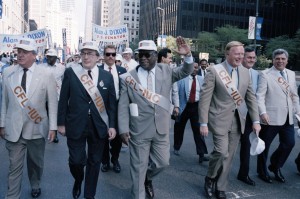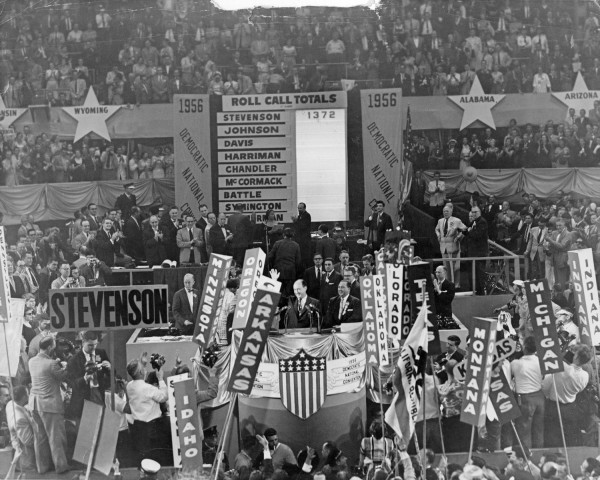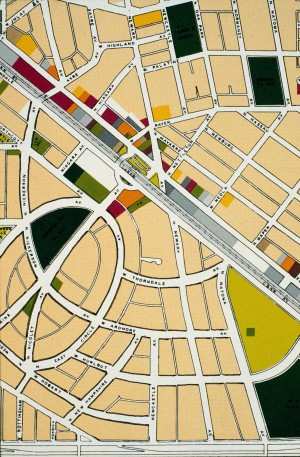Diverse Consortium Chicago Collections Welcomes Jeanne Long, DPLAfest
 These are exciting times for Chicago Collections (CC), an online member consortium of libraries, museums, historical societies, and other cultural heritage organizations in and around Chicago. CC named a new executive director, Jeanne Long, in February, and is gearing up to cohost the annual gathering of the Digital Public Library of America (DPLA) in April. CC offers a free, centralized web-based search engine and record-finding tool that allows users—researchers, teachers and scholars, students, and the general public—to browse archival material held by its member institutions by keyword, subject, participant name, city, and neighborhood; the portal also has full text search capabilities. As the Chicago Tribune wrote on CC’s launch, “Call it one-stop shopping for researchers, from high school students to wizened academics. Call it a case study in inter-institutional cooperation. Call it a free website where those curious about the story of Chicago can poke around and happily fritter away time.” In addition to the digital portal, CC has several other core components: ASK Chicago Collections, a cooperative reference network; lectures by representatives from member institutions; and exhibitions highlighting archives, manuscripts, and objects from member collections; eventually the portal will include libguides and digital exhibits.
These are exciting times for Chicago Collections (CC), an online member consortium of libraries, museums, historical societies, and other cultural heritage organizations in and around Chicago. CC named a new executive director, Jeanne Long, in February, and is gearing up to cohost the annual gathering of the Digital Public Library of America (DPLA) in April. CC offers a free, centralized web-based search engine and record-finding tool that allows users—researchers, teachers and scholars, students, and the general public—to browse archival material held by its member institutions by keyword, subject, participant name, city, and neighborhood; the portal also has full text search capabilities. As the Chicago Tribune wrote on CC’s launch, “Call it one-stop shopping for researchers, from high school students to wizened academics. Call it a case study in inter-institutional cooperation. Call it a free website where those curious about the story of Chicago can poke around and happily fritter away time.” In addition to the digital portal, CC has several other core components: ASK Chicago Collections, a cooperative reference network; lectures by representatives from member institutions; and exhibitions highlighting archives, manuscripts, and objects from member collections; eventually the portal will include libguides and digital exhibits. YEARS IN THE MAKING
Although the concept was some ten years in the making, CC was established in 2013, envisioned as a searchable web portal for cultural heritage collections focusing on Chicago and its history. With the help of a $194,000 Andrew W. Mellon Foundation grant in 2014, the Chicago Collections website was planned and developed by a board of directors gathered from the initial 12 participating institutions: the Art Institute of Chicago (AIC), Chicago History Museum, Chicago Public Library (CPL), Columbia College Chicago, DePaul University, Illinois Institute of Technology, Loyola University Chicago, Newberry Library, Northwestern University, Roosevelt University, the University of Chicago, and University of Illinois at Chicago. Strategic planning and development continued through most of 2015 to design, brand, and build the site. Developers worked to ensure that all data formats could be ingested and displayed. A controlled vocabulary task force distilled some 13,000 subjects into 88 Chicago-centric topics. Archivists at member institutions could also tag items by topic—then–executive director Jaclyn Grahl told LJ that once they saw how material was being used, many members went back into their collections to re-tag content. “This thing is ever-changing and ever-growing,” she noted.
“Workers cleaning diesel car, 14th Street passenger yards, Chicago, May 1948”
Lee, Russell, 1948–05, Courtesy of The Newberry Library
Call # CBQGR212
INTERNAL, EXTERNAL GROWTH
Outreach was a consideration even before portal was developed, and continues to be a priority for CC. Over the past year and a half, CC has grown exponentially. Membership has expanded to include Alliance Française de Chicago, Chicago State University, the School of the Art Institute of Chicago (SAIC), Lake Forest College, Northern Illinois University, the Theatre Historical Society of America, and the Chicago Zoological Society, the Chicago Academy of Sciences/Peggy Notebaert Nature Museum, Experimental Sound Studio's Creative Audio Archive, the Frances Willard Historical Association, the Oak Park Public Library, and the Hemingway Foundation of Oak Park. Supporting foundations include the MacArthur Fund for Arts and Culture at The Richard H. Driehaus Foundation and the Gaylord and Dorothy Donnelley Foundation, joined by funding through private donors and dues from member organizations. Membership is tiered, in order to attract partners ranging from smaller organizations to large institutions, and CC is hoping to attract some corporate partners with links to Chicago history as well, such as the Chicago Cubs or McDonalds—“where the corporation and the community have been tightly bound together for decades," noted Walter. In partnership with local NPR affiliate WBEZ, CC produced an August 2016 segment for the Curious City, which digs into local topics of interest. Using material from various CC member collections, the podcast and article “Zeppelin Poseurs: Why Chicago’s Airship Dreams Never Took Off” looked at Chicago architecture of the 1920s and 1930s, searching for airship mooring masts and investigating why, exactly, dirigible travel technology never quite took off. A second jointly produced show, on the history of Chicago’s Boystown—one of the first recognized gay communities in the United States—is in the works.
“Mayor Harold Washington marches in a Union Parade”
Copelin Commercial Photographers
Special Collections and University Archives, University of Illinois at Chicago Library, James S. Parker Collection, 1986, Courtesy of University of Illinois at Chicago
Call # JPCC_02_0001_0010_0011_0002
NEWS FROM CC
On February 6, CC announced the appointment of Jeanne Long as executive director, succeeding Grahl, who shepherded CC from its inception to implementation. Long served most recently as director of programs and outreach for Imerman Angels, the nation’s largest one-on-one cancer support organization. Previously, Long had an extensive career with CC’s partners, AIC and SAIC, where she served as director of committee partnership. "I think what attracted me to this consortium was the idea of being able to work with all the major cultural centers and libraries,” Long told LJ, “and having a working consortium that not only is serving knowledge of Chicago's rich resources, but serving general public inquiry throughout the world. It's frankly been an honor to witness the commitment from so many professionals in this field.” This April 20–21 CC will cohost DPLAfest 2017 with the Black Metropolis Research Consortium, CPL, and the Reaching Across Illinois Library System (RAILS). CPL became one of DPLA’s Illinois service hubs in 2015, along with the Illinois State Library, the Consortium of Academic and Research Libraries in Illinois (CARLI), and University of Illinois at Urbana-Champaign, previously a Content Hub partner. This year’s gathering, held at the Washington Library, will mark DPLA’s fourth major event bringing together librarians, archivists, museum professionals, developers, publishers, teachers, and others for interactive workshops, presentations and discussions, hackathons, and other events. Among other initiatives, CC is developing digital exhibitions working with member content. Currently the board is taking guest curator applications for a digital exhibition to launch in late summer or early fall 2018, looking at Chicago’s tradition of cultural change and protest. The exhibition, tentatively titled “The Long Tale of Protest: Chicagoans Raise Their Voices,” will use materials from member archives to document events and individuals who “advocated, protested, resisted, or simply lived through events that convulsed and transformed the city,” according to the application; the 50th anniversary of the 1968 Chicago Democratic National Convention will serve as a pivot point for the exhibition.
“Adlai Stevenson II with Richard J. Daley on the podium at the Democratic National Convention in Chicago”
Special Collections and University Archives, University of Illinois at Chicago Library, Richard J. Daley collection, Series 4, 1956, Courtesy of University of Illinois at Chicago
Call # RJD_04_01_0013_0006_005
THE POWER OF ARCHIVES
What’s next for CC? "To continue and to promote it to a wider audience,” said Long, “and to put the consortium in different populations and arenas—looking at it as not only a reference tool but a…tool for other conversations, be it on a corporate front or everyday public life.”
“Land use, Norwood Park, C. William Brubaker”
C. William Brubaker Collection, 1980, Courtesy of University of Illinois at Chicago Library. [Visual Resources]
Call # bru014_01_iF
RELATED
ALREADY A SUBSCRIBER? LOG IN
We are currently offering this content for free. Sign up now to activate your personal profile, where you can save articles for future viewing









Add Comment :-
Comment Policy:
Comment should not be empty !!!